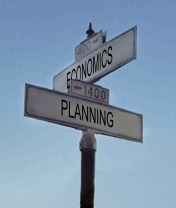Fair Haven, A small town in Vermont, with 3,000 residents recently discovered that their government has a surplus of close to one million dollars, which amounts to about two-thirds of the annual budget. At first glance, this surplus seems great and it appears that the community is doing well. Many residents, however, are angry about learning about the surplus. They charge the town has mismanaged money or worse overtaxed them. The surplus which has been accruing since 1994 occurred because the town did not spend the full amount allotted for projects such as road paving. Instead of applying the leftover money to the next year’s budget, the town treasurer invested the money in certificates of deposit and bank account and a new budget was created from scratch.
Other cities have budgets that cover the spectrum from healthy to barely staying afloat. In San Francisco they have managed to move from a deficit to having available money for economic development. Toronto's budget problems have lead to a cut in the quality of life and services for residents. Minneapolis has worked to develop a budget that reduces its debt service to provide more money for city services.
It would be interesting to see how many cities have regular surpluses and how many barely operate in the black. What should a budget look like? Low taxes, but low services and barely operating in the black. Higher taxes, good services and managing routine surpluses.
Are cities required to have a reserve fund? If so, does it have to be a certain percentage of their operating income. What is the frequency that cities dip into reserve funds to cover deficits?
Should cities slash services to reduce their deficit or do they make incremental changes and reduce costs to multiple items in their budget. Or worst of all to a resident, raise taxes.
When services are reduced, do cities take into account that lowering the level of services provided may cause people to leave since they do not feel that their tax dollars are being used properly. Budget saving techniques such as not hiring the needed number police officers or not maintaining city parks or even streets do not encourage investment in areas. The people who can and will move to get better services for the tax dollars are the kind of people the city wants to keep. There is much talk about attracting the 25 to 34 years old to cities as an economic development strategy. This can only be successful if there is a good quality of life in the area and amenities like good schools, parks, etc. A city operating in survival mode to reduce its deficit and keep the budget afloat will not be able to attract these young people and the entrepreneurial spirit they bring with them.
With all that said, what kind of state is the City of Memphis budget in?
Subscribe to:
Post Comments (Atom)

No comments:
Post a Comment